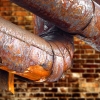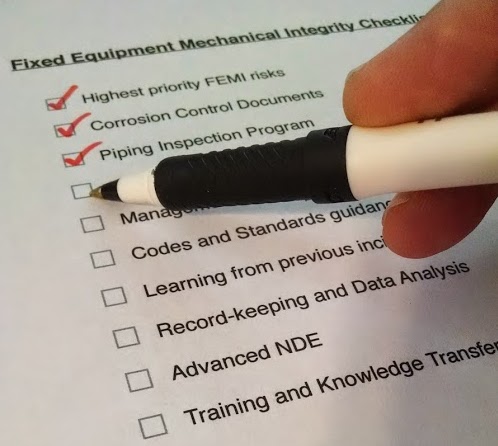RL Blogs

By John Reynolds of Inspectioneering.com
Aug 15, 2016The first part of a two part series that assesses the top ten reasons for FEMI failures that cause process safety incidents. |
||||
The ten reasons I’ve outlined are a result of doing 60+ FEMI audits within refineries and chemical plants in the last 45+ years, tracking 150+ serious FEMI incidents in the petroleum and petrochemical industry and their causes, and defending numerous clients in the industry from lawsuits pertaining to FEMI issues.
Before we jump into the first five reasons, let's start with a few quick notes:
You might look at the list that follows and say to yourself: "Well, our site already has all of those programs." My point isn't that it is the existence of each of these FEMI programs that is most important, but rather the quality and sustainability of them. If each operating site wants to largely eliminate the risk of a big FEMI event at their site, then each operating site must obtain and sustain an "A" grade on each of these top ten FEMI issues; a score of less than that will generally not suffice.
Each site needs to achieve excellence in implementation. Not just compliance, and not just "checking the box" because of some rules and regulations. Excellence simply means doing all the right things, and doing them right each and every time in accordance with an up-to-date, documented FEMI management system.
Now, let's briefly mention the first five of ten reasons for significant fixed equipment mechanical integrity failures in the hydrocarbon process industry.
Reason #1: Inadequate or lack of identifying and managing the highest priority FEMI risks in each process unit
Each process unit should keep a list of the highest FEMI risks at each site--not just a FEMI bad actors list--there's a significant difference between them which will be explained in a future article in the Journal.
The highest FEMI risk list should be prioritized with all other site resource demands and kept in front of all key stakeholders at the site. We need to help all stakeholders understand that even though most equipment damage mechanisms result in leaks with minor consequences, every once in a while they have huge process safety consequences such as fires, explosions, injuries, fatalities, adverse media attention, fines, lawsuits, and a threat to continued operations.
Does your site track and mitigate its highest risk FEMI issues in each process unit?
Reason #2: Inadequate or lack of comprehensive Corrosion Control Documents (CCD's) for each process unit
CCD's take the generic damage mechanisms found in API RP 571 and make them specific to each process unit at each site. They capture nearly everything that is known about how equipment degrades in a particular fluid service, under specific process conditions, and how to find it, avoid it, and mitigate it. CCD's, when created properly, become the primary source of knowledge transfer to all other stakeholders in the site.
I should mention that API RP 970, currently in progress of being written, will outline the entire work process to produce a comprehensive CCD.
Does your site have complete, detailed CCD's that capture everything that is known about the potential for FEMI failures in each of your process units?
Reason #3: Inadequate or lack of a thorough, comprehensive piping inspection program per industry standards
Piping systems are the source of most FEMI incidents--much more so than any other equipment item. API 570 and 574 are the sources of an immense amount of information on the various issues that result in piping systems failures, e.g.
(As a side note, if you're interested in learning more about any of the above, you should download a copy of the guide I just revised, The 101 Essential Elements in a Pressure Equipment Integrity Management Program).
Are piping leaks and failures a thing of the past at your site because you have a robust piping inspection program?
Reason #4: Inadequate or lack of a comprehensive program for Integrity Operating Windows (IOW's) for FEMI
IOW's consist of established limits on any and all process variables that could exacerbate corrosion/damage mechanisms. They include preset operator actions that must occur within a specified time duration in order to regain control of the process before increased corrosion/cracking may occur. They are classified as Critical / Standard / Informational depending on the severity of consequences from an exceedence.
IOW systems, instrumentation, and procedures are needed to help the operator know when an exceedance has occurred. Without IOW's, significant process changes can occur that affect FEMI without having to be assessed by the MOC work process (refer to Reason #5).
Do all your process units have detailed IOW's per API RP 584 (just published) established and implemented to avoid unexpected FEMI deterioration?
Reason #5: Inadequate or lack of a comprehensive Management of Change (MOC) process for all FEMI issues
Most sites do an adequate job of applying MOC for physical changes. However, most sites don't do an adequate job applying MOC for process changes which are a leading cause of FEMI incidents in the industry.
Three tips I can offer regarding your MOC program:
Is your MOC process as effective on process changes as it is on physical changes?
At this point, I’ve outlined the first five of ten reasons for fixed equipment mechanical integrity failures in the hydrocarbon process industry. I’ll follow this article up with another one that contains the remaining five reasons, which are:
Continue reading with part two.
You can sign up for the Inspectioneering Turnaround newsletter to get a notification when the next article is released. Also, be on the lookout for an expanded version of this series in Inspectioneering Journal.
See Also
| ||||
|
|


.png)
.png)







